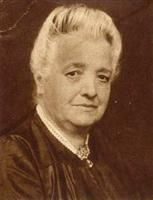Auguste Groner
Born as Auguste Kopallik. She also published under various pseudonyms - Olaf Björnson, Metis, A. v. d. Paura, Renorga.
Women writer of crime stories
Auguste Groner was more popular than Sir Arthur Conan Doyle at the peak of her career as a writer of crime stories, then completely forgotten. Nowadays she enjoys a renaissance in relevant reading circles, but is still an insider tip. She combined literary achievements with educational, social and feminist engagement.
Auguste’s father was a public servant. She received a good education, which included painting, and she travelled quite a lot. From 1876 till 1905 she worked as a teacher in primary school. 1879 she married Richard Groner, lexicographer, journalist, founder and chief editor of “Das interessante Blatt” (‘The interesting Paper’).
It was her husband, who encouraged her to write and facilitated initial publications (1882). She wrote historical and phantasy novels, homeland, folklore and adventure novels for juveniles (1894 she also founded a magazine and a library for juveniles and for that received and imperial medal of distinction). She published articles about local history and geography. In the periodicals her riddle poems were highly popular for some time.
In her later years she also turned to writing mystical and eerie stories. It appears that she developed an inclination for the supernatural. She also acquired an old castle in Styria
Burg Alt Teufenbach.
What she became really famous for though, were crime stories. Auguste invented what some sources claim was the first serial detective in German crime literature - Joseph Müller (member of the secret service Austrian imperial police), who became for some time more popular than Sherlock Holmes. Müller is a much more subdued character than the self -confident Holmes. In contrast to the strictly rational and purely scientific type of detective, Joseph Müller is empathic and caring, interested in people, sympathizing with the underdogs in society – however, of course brilliant in methodology. In her novels she focused on social circumstances as contributing factors to crime, and she strongly advocated that men and women should have equal rights. Auguste based some of her novels on real unresolved criminal cases and developed a very refined psychological approach. The solutions she offered in her books in two cases even made it possible for the police to find the real perpetrators.
Since she did not stick to the designated gender role, there was of course criticism –
Moißl/Krautstengel:
“ The author took great pains to make use of the rich material at her disposal. But it seems that a woman should not touch such subject matters. To be able to describe vigorous men, it is not sufficient to study sources from cozy home…. the author is not versed in such matters. In real life there are things which only a man can properly understand”.
Nevertheless she reached great popularity, her books were translated into several languages. Especially in the USA she enjoyed widespread publicity (Joseph Müller became Joe Miller) and in 1893 she was invited to the literary section of the World Exhibition in Chicago and received an award (even today her name is listed in the US Library of Congress). Hollywood could not fail to take interest, Auguste herself wrote the scripts for two films.
Nowadays, „Mörderische Schwestern“ („Sisters in Crime“), an association for female authors of crime stories bestow the award „Golden Auguste” every 3 years to a person, who rendered outstanding services to the promotion of female crime literature.
Sources
- http://othes.univie.ac.at/1514/1/2008-09-26_6100022.pdf, Diplomarbeit S 82
- Evelyne Polt-Heinzl: „Zeitlos : neun Porträts : von der ersten Krimiautorin Österreichs bis zur ersten Satirikerin Deutschlands“
- http://www.ruprechtsviertel.alt-wien.eu/html/15_wr__neust__hof.html
- Österr. Akademie der Wissenschaften http://viaf.org/viaf/15574476/
- Edith Kneifl: Preface in ‘Der rote Merkur’, Vlg. ADA-Bibliothek der Frauen, 2011, Stuttgart
Photocredits: Auguste Groner aus Littera: die Welt der Literatur , author unknown
Source: Picture Archive ONB aus Littera die Welt der Literatur
kind permission ONB (Austrian National Library) of 20.01. 2014
http://www.fraueninbewegung.onb.ac.at/Pages/PersonDetail.aspx?p_iPersonenID=13572920




